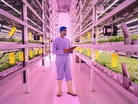How the UAE plans to triple food production, reduce imports

When it comes to food, the UAE has long been reliant on others.
Like other countries with desert climates, the Gulf country has resorted to dependence on food imports – importing 85% of its food supplies.
But change is afoot.
In line with its National Food Security Strategy 2051 targets, the UAE is looking to increase food production and agriculture in the country, adopt more advanced food technologies, and improve nutrition while also reducing waste.
“Food security is a vital sector in the UAE and around the world, especially at a time of rising challenges,” HE Mariam bint Mohammed Almheiri, the UAE Minister of Climate Change and Environment said during the 1st National Dialogue for Food Security in March.
“In less than three years, we have experienced two major crises that posed major threats to global food security, causing disruptions in the global food supply chain, namely following the pandemic and the recent global conflicts.”
Propelled by such crises, including the biggest crisis of them all – global warming – the UAE has set its targets for reducing food imports high.
The country is looking to secure 50% of some basic food requirements from local farms and producers by the end of 2023, with the aim of increasing the target to 70% by 2025 and ultimately 100% by 2030.
And in true UAE style, plans to place first in the Global Food Security Index (GFSI) by 2051.
The UAE already topped the MENA region in the GFSI in 2022, and ranked 23rd globally, up 12 places from the year before.
This is largely thanks to heavy investment in sustainable local food production, with initiatives such as Ne'ma (the country's National Food Loss and Waste Initiative) and the deployment of advanced technology to strengthen local food production.
In 2020, the UAE announced a US$100m investment in indoor farming and the following year announced a new food tech hub in Dubai – designed to boost internal food security while simultaneously turning the UAE into a global superpower for food tech.
Food Tech Valley to triple Dubai’s food production
The first of its kind in the region, Food Tech Valley is currently in the first phase of development and once up and running aims to triple the amount of food produced in Dubai.
A partnership between the Ministry of Food and Water Security and Wasl Properties, the project aims to create a modern city that will be home to vertical farms, a logistics centre, R&D centre and shopping area and will support farmers and producers across the UAE and globally.
Not only that, but with a focus on developing modern technologies for food production along with overcoming water scarcity and arable land shortage, it will set future food standards and support the UAE’s efforts to adopt technologies and solutions that contribute to combating climate change and preserving the environment and natural resources from waste”, Almheiri says.
This is especially important given the UAE is hosting COP28 in November, when the country’s own sustainability efforts will be thrust into the global spotlight.
Vertical farms already rising
Vertical farms have already made their debut in Dubai with the world’s largest hydroponic farm Crop One opening its doors last year.
A collaboration between Crop One Holdings and Emirates Flight Catering, the 330,000-sq-ft facility uses 95% less water than field-grown produce and is guaranteed an output of three tons per day – with the capacity to produce over 2 million pounds of leafy greens annually.
Already, passengers on Emirates and other airlines will eating the leafy greens, while the produce is available in stores locally under the Bustanica brand.
Meanwhile, UAE-based agritech Pure Harvest Smart Farms is opening high-tech hybrid smart farms across the region, including the UAE.
Based on the country’s commitment to growing agriculture, the industry in the UAE is likely to see a CAGR of 3.5% between 2022 and 2027, according to a recent report by Sharjah Technology and Innovation Park report.
There is certainly no shortage of support for agritech startups in the emirates.
Agritech startup investments
Abu Dhabi’s Masdar City announced last year plans to host a ‘beta-site’ to test the prospects for early-stage agritech projects launched and piloted in the emirate.
And earlier this year, Abu Dhabi Agriculture and Food Safety Authority announced the signing of an agreement with investment accelerator Hub71, to promote the development and adoption of ground-breaking technologies in agriculture, food safety and biosecurity.
Getting in on the action too, diversified F&B giant Agthia Group announced the launch in July of a VC fund to invest in agritech and food startups that focus on sustainability solutions in farming and alternative proteins, among other segments.
Among other initiatives aimed at reducing food imports and tackling climate change, Dubai recently opened two plant-based meat factories.
The first, in March, belongs to UAE Thryve, a UAE-founded vegan brand from leading FMCG multinational IFFCO Group. Credited with being the UAE and Middle East’s first 100% plant-based meta factory, the facility is looking to target up to 30% of the GCC population and recently launched in Saudi too.
Two months after the launch of Thryve's facility, homegrown company Switch Foods opened its plant-based factory in Abu Dhabi with the aim of producing 1,000kg of plant-based meat per hour.
The products, which are available in supermarkets across the country, include kebab, soujuk, kofta, burger patties and minced meat. All of them are 100% plant-based, mainly from peas.



